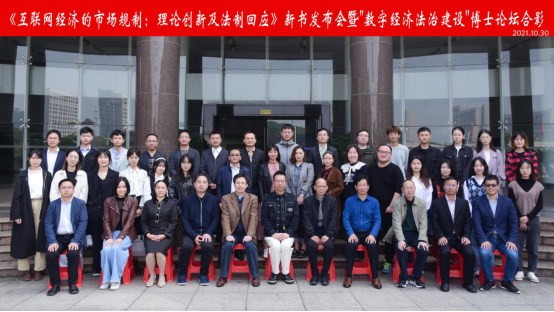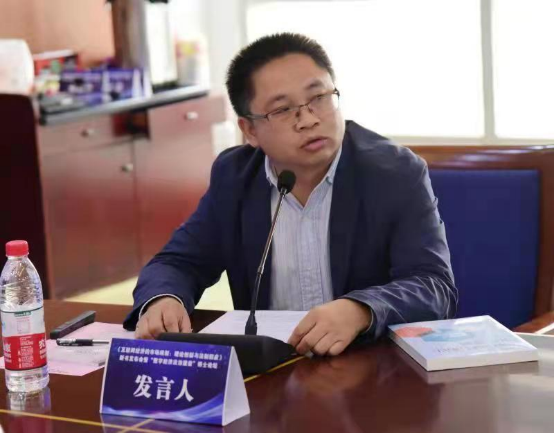(Reported by Liao Jianqiu) On October 30, 2021, the book launch of Market Regulation of Internet Economy: Theoretical Innovation and Legal Response & the doctoral forum of Legal Construction of Digital Economy were successfully held in Hubei University of Economics. This book launch and the doctoral forum were sponsored by School of Law, Hubei University of Economics and Hubei Institute of Economy and Law. Nearly 70 experts, scholars, doctors and doctoral students from universities and research institutions such as China University of Political Science and Law, Wuhan University, Zhongnan University of Economics and Law, China University of Geosciences (Wuhan), South China University of Technology and Guizhou University, as well as the l practice departments such as Guangzhou Yuexiu Financial Work Bureau and Guizhou Panjiang Coal and Electricity Group carried out the in-depth communication around the theme of "building the rule of law in digital economy" in online and offline manners. Associate Professor Liao Jianqiu, Head of Department of Law of School of Public Administration, was invited to attend the forum.

At the opening ceremony, Professor Wu Handong, Director of Academic Committee, Senior President and Doctoral Supervisor of Zhongnan University of Economics and Law, Senior Editor Wang Liping, Deputy Editor-in-Chief of China Legal Science, Professor Shi Jianzhong, Vice President and Doctoral Supervisor of China University of Political Science and Law, and Professor Ning Lizhi, Director and Doctoral Supervisor of Institute of Intellectual Property and Competition Law of Wuhan University, Professor Fan Qirong from Zhongnan University of Economics and Law, Senior Editor of Jianghan Tribune and Researcher Li Tao from Hubei Academy of Social Sciences, Senior Editor of Studies in Law and Business and Professor Zhai Zhongju from Zhongnan University of Economics and Law extended their warm wishes to Professor Liu Dahong through online videos and spoke highly of the academic value of this book. After the opening ceremony, the participating experts and scholars conducted in-depth discussions and exchanges on "the market regulation of Internet economy" in online and offline manners and delivered their own insights.
Liao Jianqiu, Associate Professor of Law Department of this School, gave a special report on Key Points and Difficulties of Regulation of Data Capture Behaviors with Anti-Unfair Competition Law. He pointed out: 1. On the basis of regulation, the regulation of data capture behaviors with anti-unfair competition law was facing the innovation of regulation theory, especially under the background that encouraging innovation was regarded as one of the legislative objectives when the anti-monopoly law was revised, when the anti-unfair competition law was adopted to regulate the unfair competition in the digital economy, does it also need to break through the existing pattern of "triple purpose superposition" in legislation, and then encourage innovation as the legislative purpose of the anti-unfair competition law? 2. In the regulatory dilemma, at present, the difficulties existed in judicial application and evaluation mode in the regulation with anti-unfair competition law. The mainstream analysis framework of regulation with anti-unfair competition law for operators' data capture behaviors was "general clauses + internet clauses". It was difficult for too abstract and generalized general clauses and vague and uncertain network clauses to solve data capture disputes fairly. The damage-oriented evaluation model of competitive damage outlook was difficult to cope with the data behavior that reflected the improvement of information resource utilization efficiency. 3. As to the path selection, The regulation of the data capture behavior with the anti-unfair competition law should follow the regressive regulation path to enhance the adaptability and flexibility of the regulation, and should also make effective the relationship between the market mechanism and the government mechanism, so that the operators could formulate ethical standards, industry self-discipline rules and participate in the decision-making and implementation of government regulation by means of business ethics. 4. In the aspect of system construction, we should adopt the comprehensive identification rules with "competition efficiency" as the core, supplemented by factors such as data type, behavior performance, competition effect, business ethics, interest measurement and market innovation, etc. In addition, we should strengthen the typing of data capture behaviors and the construction of pre-litigation injunction system.

The topics of this conference covered the problems such as the relationship between public domain and private domain in the digital economy era, abuse of "compliance" in the digital economy era, data capture regulation in the background of "two-anti", illegal prohibition of digital platform and regulation of algorithm abuse, legal system construction of digital finance, interlacing of consumer rights protection law and competition law in the digital economy, anti-monopoly of social platform, and digital economy. The issues such as the regulation of labor law on behalf of the platform, etc., were wonderful in content and highly constructive and practical in value.